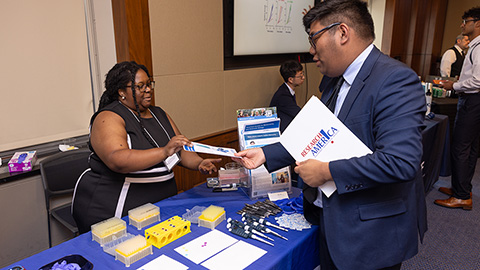Sexual harassment working group releases report
A National Institutes of Health working group has proposed policy changes to end sexual harassment in science, covering themes of increased transparency, restorative justice and inclusive work environments.
After a year of private meetings, public listening sessions and hours upon hours of work by a group of dedicated scientists and other stakeholders, the NIH’s Advisory Committee to the Director, or ACD, heard from its Working Group on Changing the Culture to End Sexual Harassment. The group’s detailed report highlights the impact of sexual harassment on scientists across the country and, more importantly, outlines a detailed roadmap of policy changes to change culture and work toward making sexual harassment in science a thing of the past.
The American Society for Biochemistry and Molecular Biology applauds the hard work of the ACD working group and its final product as well as NIH Director Francis Collins’ acceptance of the group’s report.
“I am supportive of these solid recommendations,” Collins said in December. “NIH will make every effort to adhere to the vision of the working group by seeking to implement the recommendations provided.”
The ASBMB Public Affairs Advisory Committee looks forward to working with NIH leadership and partnering to ensure the recommendations are adopted in agency policy. Having reviewed the working group’s report, the PAAC believes it elucidates needed next steps.
Specifically, the PAAC will advocate to ensure the following recommendations are prioritized and quickly implemented:
- Recommendation 1.1a: NIH should immediately establish a process to report findings of professional misconduct.
- Recommendation 1.5: NIH should exclude researchers with a confirmed finding of sexual harassment from participating in NIH study sections or NIH advisory councils/committees for a determined period of time.
- Recommendation 2.2: NIH should develop mechanisms for bridge funding for targets and affected individuals who lose their salary support due sexual harassment.
- Recommendation 3.2: All NIH grants should have specific expectations and requirements for maintaining a safe training and research environment.
- Recommendation 4.1a: NIH should ensure that review actions and funding decisions are free of bias related to gender and work to address disparities.
All the ACD’s recommendations are worth implementing, and we hope the NIH will develop plans to adhere to all of them.
To monitor progress on the working group’s recommendations, visit this new page, where we will provide an outline of all the recommendations and updates on which have been addressed by the NIH and the community.
Enjoy reading ASBMB Today?
Become a member to receive the print edition four times a year and the digital edition monthly.
Learn moreGet the latest from ASBMB Today
Enter your email address, and we’ll send you a weekly email with recent articles, interviews and more.
Latest in Policy
Policy highlights or most popular articles

Embrace your neurodivergence and flourish in college
This guide offers practical advice on setting yourself up for success — learn how to leverage campus resources, work with professors and embrace your strengths.

ASBMB honors Lawrence Tabak with public service award
He will deliver prerecorded remarks at the 2025 ASBMB Annual Meeting in Chicago.

Summer internships in an unpredictable funding environment
With the National Institutes of Health and other institutions canceling summer programs, many students are left scrambling for alternatives. If your program has been canceled or delayed, consider applying for other opportunities or taking a course.

Black excellence in biotech: Shaping the future of an industry
This Black History Month, we highlight the impact of DEI initiatives, trailblazing scientists and industry leaders working to create a more inclusive and scientific community. Discover how you can be part of the movement.

ASBMB releases statement on sustaining U.S. scientific leadership
The society encourages the executive and legislative branches of the U.S. government to continue their support of the nation’s leadership in science.

ASBMB and advocacy: What we accomplished in 2024
PAAC members met with policymakers to advocate for basic scientific research, connected some fellow members with funding opportunities and trained others to advocate for science.

